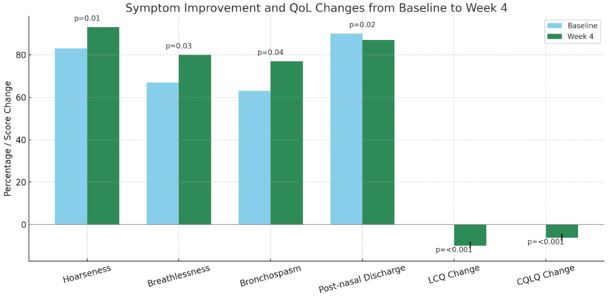Clinical Evaluation of Kofsap-Sf Cough Syrup for Persistent Cough Relief: A Pilot Study
DOI:
https://doi.org/10.21760/jaims.10.7.5Keywords:
Persistent cough, herbal medicine, sugar-free syrup, Kofsap-SF, respiratory healthAbstract
Introduction: Persistent cough significantly impacts patient well-being. Traditional cough syrups often contain sugar, which can be unsuitable for diabetic or health-conscious individuals.
Objective: To evaluate the clinical efficacy and safety of Kofsap-SF, a sugar-free herbal syrup, in relieving persistent cough and improving quality of life.
Methods: An open-label, single-arm pilot study was conducted with 30 participants aged 35–60 years diagnosed with persistent cough. Participants received 10 ml of Kofsap-SF syrup three times daily for 2–4 weeks. Symptom severity and quality of life were assessed using the Cough-Specific Quality of Life Questionnaire (CQLQ).
Results: The average symptom score decreased from 14 at baseline to 8 by Week 2 and 4 by Week 4. Quality of life scores improved from 10 to 4. 63% of participants showed significant symptom relief by Week 2; the remainder responded by Week 4. No adverse effects were reported.
Conclusion: Kofsap-SF is an effective sugar-free herbal remedy for persistent cough, demonstrating symptom reduction and improved quality of life. Larger randomized trials are warranted.
Downloads
References
Morice AH, Millqvist E, Bieksiene K, Birring SS, Dicpinigaitis PV, Domingo Ribas C, et al. ERS guidelines on the diagnosis and treatment of chronic cough in adults and children. Eur Respir J. 2020;55(1):1901136.
Song WJ, Chang YS, Faruqi S, Kim JY, Kang MK, Kim YS, et al. The global epidemiology of chronic cough in adults: A systematic review and meta-analysis. Eur Respir J. 2015;45(5):1479–1481.
Chung KF, Pavord ID. Prevalence, pathogenesis, and causes of chronic cough. Lancet. 2008;371(9621):1364–1374.
French CL, Irwin RS, Curley FJ, Krikorian CJ. Impact of chronic cough on quality of life. Arch Intern Med. 1998;158(15):1657–1661.
International Diabetes Federation. IDF Diabetes Atlas. 10th ed. Brussels: IDF; 2021.
Sharma H, Chandola HM, Singh G, Basisht G. The role of Ayurveda in modern healthcare: A review of integrative approaches. J Altern Complement Med. 2018;24(9–10):867–874.
Irwin RS, Baumann MH, Bolser DC, Boulet LP, Braman SS, Brightling CE, et al. Diagnosis and management of cough: ACCP evidence-based clinical practice guidelines. Chest. 2018;153(2):196–209.
Dicpinigaitis PV. Chronic cough: New insights and future directions. Lung. 2015;193(6):933–939.
Mukherjee PK, Nema NK, Venkatesh M, Debnath PK. Evidence-based validation of herbal medicine: Translational research on botanicals. J Ethnopharmacol. 2017;197:1–12.
Patwardhan B, Wang J, Pan Y, Zhang J. Ayurveda and traditional Chinese medicine: A comparative overview. Evid Based Complement Alternat Med. 2015;2015:532412.
World Health Organization. Respiratory diseases in low-resource settings: Challenges and opportunities. Geneva: WHO; 2023.
Maizes V, Rakel D, Niemiec C. Integrative medicine and patient-centered care. Explore. 2009;5(5):277–289.
World Medical Association. Declaration of Helsinki: Ethical principles for medical research involving human subjects. JAMA. 2013;310(20):2191–2194.
Ministry of AYUSH, Government of India. The Ayurvedic Pharmacopoeia of India. Part I, Vol VI. New Delhi: Government of India; 2008.
Birring SS, Prudon B, Carr AJ, Singh SJ, Morgan MDL, Pavord ID. The Leicester Cough Questionnaire: A new tool for assessing chronic cough. Thorax. 2003;58(4):339–343.
French CT, Irwin RS, Fletcher KE, Adams TM. A cough-specific quality-of-life questionnaire for clinical trials. Chest. 2002;121(4):1123–1131.
Raj AA, Pavord ID, McGarvey L, Birring SS. Minimal important difference of the Leicester Cough Questionnaire in chronic cough. Chest. 2009;135(6):1289–1294.
Mukherjee PK, Nema NK, Venkatesh M, Debnath PK. Evidence-based validation of herbal medicine: Translational research on botanicals. J Ethnopharmacol. 2017;197:1–12.
International Diabetes Federation. IDF Diabetes Atlas. 10th ed. Brussels: IDF; 2021.
World Health Organization. Respiratory diseases in low-resource settings: Challenges and opportunities. Geneva: WHO; 2023.















